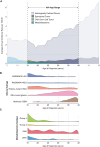Central nervous system tumors in adolescents and young adults: A Society for Neuro-Oncology Consensus Review on diagnosis, management, and future directions
- PMID: 39441704
- PMCID: PMC11726256
- DOI: 10.1093/neuonc/noae186
Central nervous system tumors in adolescents and young adults: A Society for Neuro-Oncology Consensus Review on diagnosis, management, and future directions
Abstract
Adolescents and young adults (AYAs; ages 15-39 years) are a vulnerable population facing challenges in oncological care, including access to specialized care, transition of care, unique tumor biology, and poor representation in clinical trials. Brain tumors are the second most common tumor type in AYA, with malignant brain tumors being the most common cause of cancer-related death. The 2021 WHO Classification for central nervous system (CNS) Tumors highlights the importance of integrated molecular characterization with histologic diagnosis in several tumors relevant to the AYA population. In this position paper from the Society for Neuro-Oncology (SNO), the diagnosis and management of CNS tumors in AYA is reviewed, focusing on the most common tumor types in this population, namely glioma, medulloblastoma, ependymoma, and CNS germ cell tumor. Current challenges and future directions specific to AYA are also highlighted. Finally, possible solutions to address barriers in the care of AYA patients are discussed, emphasizing the need for multidisciplinary and collaborative approaches that span the pediatric and adult paradigms of care, and incorporating advanced molecular testing, targeted therapy, and AYA-centered care.
Keywords: adolescents and young adults; brain tumors; precision medicine; survivorship.
© The Author(s) 2024. Published by Oxford University Press on behalf of the Society for Neuro-Oncology. All rights reserved. For commercial re-use, please contact reprints@oup.com for reprints and translation rights for reprints. All other permissions can be obtained through our RightsLink service via the Permissions link on the article page on our site—for further information please contact journals.permissions@oup.com.
Conflict of interest statement
M.L.: Advisory Board for Servier, Novocure; M.T.: Consulting or advisory role for Servier, Novocure, NH TherAguix, Resilience, Agios Pharmaceutical, Integragen, and Taiho Oncology; Honoraria from Ono; research funding from Sanofi E.F.: Advisory Board for Incyte and Genenta J.F.: Educational Speaker’s Bureau for DayOne Biopharmaceuticals. R.R.: Advisory board or committee for Servier; Consultancy for Novocure, Servier, Genenta, CureVac, Grant for scientific project from Bayer. P.H.: Consultancy for Bayer, BMS, and Novocure; Honorarium from Novocure S.H.J.: K08 award (K08 NS110919-01—NIH). M.v.d.B.: Honoraria for consultancy from Anheart Therapeutics, Boehringer Ingelheim, Fore Biotherapeutics, Genenta, Incyte, Mundipharm, Chimerix, Roche, and Servier; Support for travel to meetings by Servier J.J.M.: Consultancy for Servier. P.Y.W.: Research Support from Astra Zeneca, Black Diamond, Bristol Meyers Squibb, Chimerix, Eli Lily, Erasca, Global Coalition For Adaptive Research, Kazia, MediciNova, Merck, Novartis, Quadriga, Servier, VBI Vaccines; Advisory Board/Consultant for Anheart, Astra Zeneca, Black Diamond, Celularity, Day One Bio, Genenta, Glaxo Smith Kline, Insightec, Kintara, Merck, Mundipharma, Novartis, Novocure, Sapience, Servier, Symbio, Tango, Telix. E.B.: Novartis, Alexion, Gilead, Servier and Fore US Bio.
Figures


References
-
- Close AG, Dreyzin A, Miller KD, Seynnaeve BKN, Rapkin LB.. Adolescent and young adult oncology-past, present, and future. CA Cancer J Clin. 2019;69(6):485–496. - PubMed
-
- Coccia PF, Pappo AS, Beaupin L, et al. Adolescent and young adult oncology, version 2.2018, NCCN clinical practice guidelines in oncology. J Nat Comp Cancer Netw. 2018;16(1):66–97. - PubMed
Publication types
MeSH terms
Grants and funding
LinkOut - more resources
Full Text Sources

